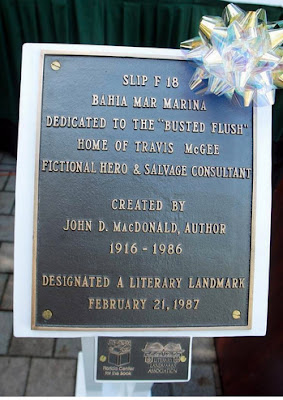Sunday, December 29, 2019
John D. MacDonald: 1916-1986
This obituary was written for the Asbury Park (N.J.) Press shortly after John D. MacDonald's death on Dec. 28. 1986. It's reprinted here for the first time.
By W.C. STROBY
PRESS STAFF WRITER
They’re putting up a plaque down at the Bahia Mar marina in Fort Lauderdale, Fla. It’s to mark slip F18, a famous place as far as boat slips go. To millions of mystery readers it is close to a literary landmark, and the plaque is there as a tribute both to the marina’s most famous resident and the man who created him.
When John D. MacDonald died on Dec. 28 at age 70, he left a legacy that few writers can match. One of America’s best-selling writers for nearly 30 years, MacDonald was the author of 77 novels – 21 of which featured the inimitable Travis McGee, a lanky, slightly battered boat bum and private avenger who became one of fiction’s most popular creations.
From his first appearance in “The Deep Blue Good-By” in 1964 to his final adventure in last year’s “The Lonely Silver Rain” (all the books had colors in their titles), McGee found his way into the hearts of millions, with each book entering the bestseller list as soon as it was published.
With more than 30 million copies of his adventures sold, McGee was the type of fictional character other writers could only hope to create. Complex, multi-layered, tough yet tender, McGee was what every man wanted to be and every woman wanted to find. Operating out of his houseboat “The Busted Flush,” McGee’s specialty was conning the con men, fending off the human predators and avenging the helpless – as well as bedding the willing damsels in distress.
Unlike his other compatriots in popular fiction, McGee avoided violence if possible and eschewed casual sex, while preferring to philosophize on the general state of the world. His adventures offered not only mystery and suspense, but words to live by as well, sometimes voiced through MCGee’s best friend and confidante Meyer, the economist and fellow boat bum who served as McGee’s conscience and alter ego. The McGee books came to be about the price of violence as much as its practice.
According to Leona Nevlar, editor-in-chief at Fawcett Books, who worked closely with MacDonald since 1973, the secret to McGee’s success was the underlying sense of morality and humanism that MacDonald incorporated into him.
“Travis changed and grew a great deal,” she said. “He began as the conventional macho detective and eventually became a full person. He got older, he got depressed at times. He grew just like the rest of us. I think that was the greatest attraction. The plots were good, but the plots were not what held people all those years.”
Once referred to by science fiction author Harlan Ellison as “the last honest hack,” MacDonald was a writer who knew his limitations and lost no sleep over what some saw as his refusal to devote himself to “serious” works.
“The fact of a writer taking himself seriously does not make of him a ‘serious’ writer,” MacDonald once wrote. “I know that I am involved in entertainment, but I also know that the more entertaining a book is the more readers it will reach, and if the entertainment is built upon some solid foundations of awareness of the world, then there will be a resonance about the work which can in certain ways alter the internal climate and the outward perceptions of the reader.”
Throughout the McGee novels, as well as his other books, MacDonald voiced his concern over many social issues, including conservation and the growing development and “uglification” of his beloved Florida. Concern for the environment was at the heart of many of his best-known non-McGee works, including 1963’s “A Flash of Green,” 1979’s “Condominium,” and his final published novel, last year’s “Barrier Island.”
“John was interested in a great deal of things,” said Ms. Nevlar in a phone interview from her New York City office shortly after MacDonald’s death. “Politics, the environment, morality – there were a lot of things he was thinking about, a lot of things he cared about. John was one of those people who cared very much about the way things work. Anything that was in the books, he knew about, whether it was a gun or a martini or the way condominiums are financed.”
Born in Sharon, Pa., in 1916, MacDonald attended the Wharton School of Finance and the Syracuse School of Business before earning a master’s degree from the Harvard School of Business in 1939. After serving in the Army during World War II with the Office of Strategic Services in the China-India-Burma theater, he returned to the States to find that his wife had successfully sold a story he had written for her while overseas.
In the following months, MacDonald wrote nearly 500 stories, both for the “pulp” magazines of the day as well as the more upscale markets of Esquire and Cosmopolitan. As he once wrote, "if you want to write, you write. The only way to learn to write is by writing ... because there is no other way to do it. Not one other way.”
Eventually moving to Sarasota, Fla., where he spent the rest of his life, MacDonald continued to maintain a highly disciplined writing schedule. Even into his 60s, he wrote every day from 8:30 a.m. to 6 p.m., producing anywhere from 900 to 9,000 words (about 28 typed pages) a day.
“There is not a day that I cannot get a quick electric feeling when I roll the white empty paper into the machine,” he wrote.
In 1972, MacDonald was given the Grand Master Award from the Mystery Writers of America, and in 1980, the American Book Award mystery competition prize for “The Green Ripper,” his 18th Travis McGee novel. He was working on his 22nd McGee – title unknown – at the time of his death.
Troubled with heart problems ever since suffering a minor heart attack in 1970, MacDonald’s last battle was fought not in his beloved Florida but in snow-frozen Milwaukee, Wisc., where he had gone to have a bypass operation – an operation from which he never recovered.
Ironically, “The Lonely SIlver Rain” contained a closing revelation that gave McGee a new outlook on life. Increasingly cynical, world-weary and lonely, McGee himself was beginning to seem an anachronism. But the book’s closing pages gave him a new reason to live, and opened up a new chapter in his life. Suddenly there were new places to go, new dragons to slay. A life worth living to the fullest.
Goodbye, Travis. And goodbye, John D. You will be missed.
(Miami Herald photo)
Subscribe to:
Post Comments (Atom)










3 comments:
Excellent obit. I've read a lot of MacDonald's standalone novels--April Evil is a particular favorite, and I recently enjoyed A Key to the Suite--but I haven't read his Travis McGees. You make me want to check out one pronto.
Nice insight into his working life and his writer's credo too. Thanks for posting this! (And I found it thanks to a tweet by Ron Clinton.)
Thanks for your note, Irv. The McGees are great. I'd start with DEEP BLUE GOOD-BY.
I'm going to look for it. Thanks, Wallace. Happy New Year to you!
Post a Comment